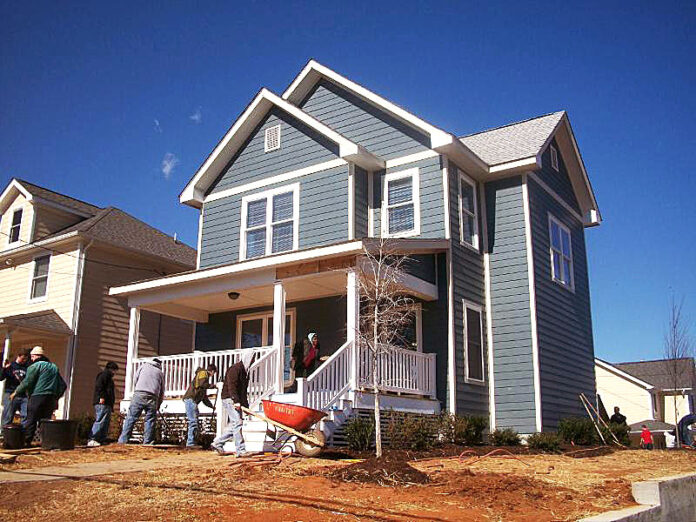
Since 1986, Habitat for Humanity has built 167 houses in Roanoke City—save for one in Vinton and one in Roanoke County. In 2002, Habitat opened its “Restore” retail donation store, the money from which goes to funding Habitat’s building projects. Two years after opening its doors for business, Restore moved to its current location, 403 Salem Avenue in downtown Roanoke, where it has more space.
Currently Habitat is completing its three-year project in the Hurt Park area of Roanoke. During this time, working in conjunction with various organizations on several projects—rehabs, limited repairs, and new construction—Habitat has built ten new homes, along with a total rehab of three houses. The result of this effort, explains the deputy director of Habitat’s Roanoke office, Betsy Whitney, has been a major change in the neighborhood. “The city, for the past ten years, has focused its building efforts in certain neighborhoods, and will stay there two to four years in each neighborhood so that you can make a significant contribution and change.”
Habitat’s next project, in the Mountain View neighborhood, will introduce a new aspect to Habitat’s operations: a limited repairs program. Where Habitat had been solely involved with new construction, it will now undertake seven limited repair projects as part of the Mountain View program.
Additionally, Habitat conducted a physical survey of every house in the area to ascertain what exactly needs to be done for each residence, then held a focus group with city residents to determine what they wanted to see done to improve the neighborhood. Once the Mountain View project has been completed, another survey and focus group will be conducted to determine what changes—both to the houses and the people occupying them—have occurred as a result, yielding what Whitney calls “quantifiable data” as to these changes.
Whitney explains that Habitat became interested in Mountain View because of the efforts of the area’s neighborhood association, which won the “Best Old Neighborhood to Buy an Old House in the State of Virginia” Award. “That is quite an accomplishment, and we’re proud of them. They’re worthy of the award,” said Whitney.
As a rule, Habitat chooses the houses it works on where it has property, and, said Whitney, “it might vary throughout the city.” In the case of Hurt Park, the City asked Habitat to partner with them: “we were more than happy to do so.”
To qualify for a Habitat building project, a family must meet three criteria. The first is need. “The person or the family must show that their current living situation is inadequate,” noted Whitney. They must also have a willingness to partner and must be willing to work on their own house. In addition, they must work on the houses of other Habitat families. “We have a minimum of two hundred sweat equity hours in which they must perform before they can move into their own house,” said Whitney.
The third is the ability to pay. “We do have a mortgage payment – they have to prove that they have a steady income, and that they are within 30 to 60 percent of the area’s medium income. We do charge for the houses. The families will get the house with a typical 20 to 30 year mortgage just like anyone else. The key difference is that …they have a zero interest mortgage. Those mortgage payments are used to help fund the next Habitat house.”
Another source of funding for Habitat for Humanity’s projects, the Restore retail and donation store, accepts donations from both individuals and businesses. “Much of it is used, much of it is new, whether it be excess inventory or something of that nature,” said Whitney, “[and] we have a good mix of new and used. Anyone that donates will get a tax receipt for that donation and then we sell it at 30 to 70 percent off its retail value.”
The result, Whitney adds, is a winning situation for everyone. “The donor gets a tax deduction, the purchaser gets a great buy on good merchandize, and then more Habitat houses are built with that money.” A year-round fund raiser for Habitat, Restore has acquired a loyal customer base in the Roanoke Valley.
“Many of them Whitney said, “are do-it-yourselfers, working on their own house. Many of them are landlords seeking great deals to replace things in their apartment buildings. And some people are just treasure hunters. You just get people who want to come in and find the best bargain they can.”


